MBA600 Reflective Essay: Skills and Career Development
VerifiedAdded on 2022/11/15
|10
|3391
|249
Essay
AI Summary
This reflective essay analyzes the learning acquired through the MBA capstone project and assessments, reflecting on the skills developed throughout the MBA program and their application in future career endeavors. The essay explores the evolution of the student's mindset, skills, and behavior, focusing on the four essential capstone skills: theoretical, practical, applied, and reflective. It examines the integration of theory and practice, strategic thinking, teamwork, and communication skills. Furthermore, the essay discusses how the developed skills, including critical thinking, problem-solving, people management, and emotional intelligence, are instrumental in navigating future career challenges and opportunities, providing insights into the student's growth and preparedness for the business world.
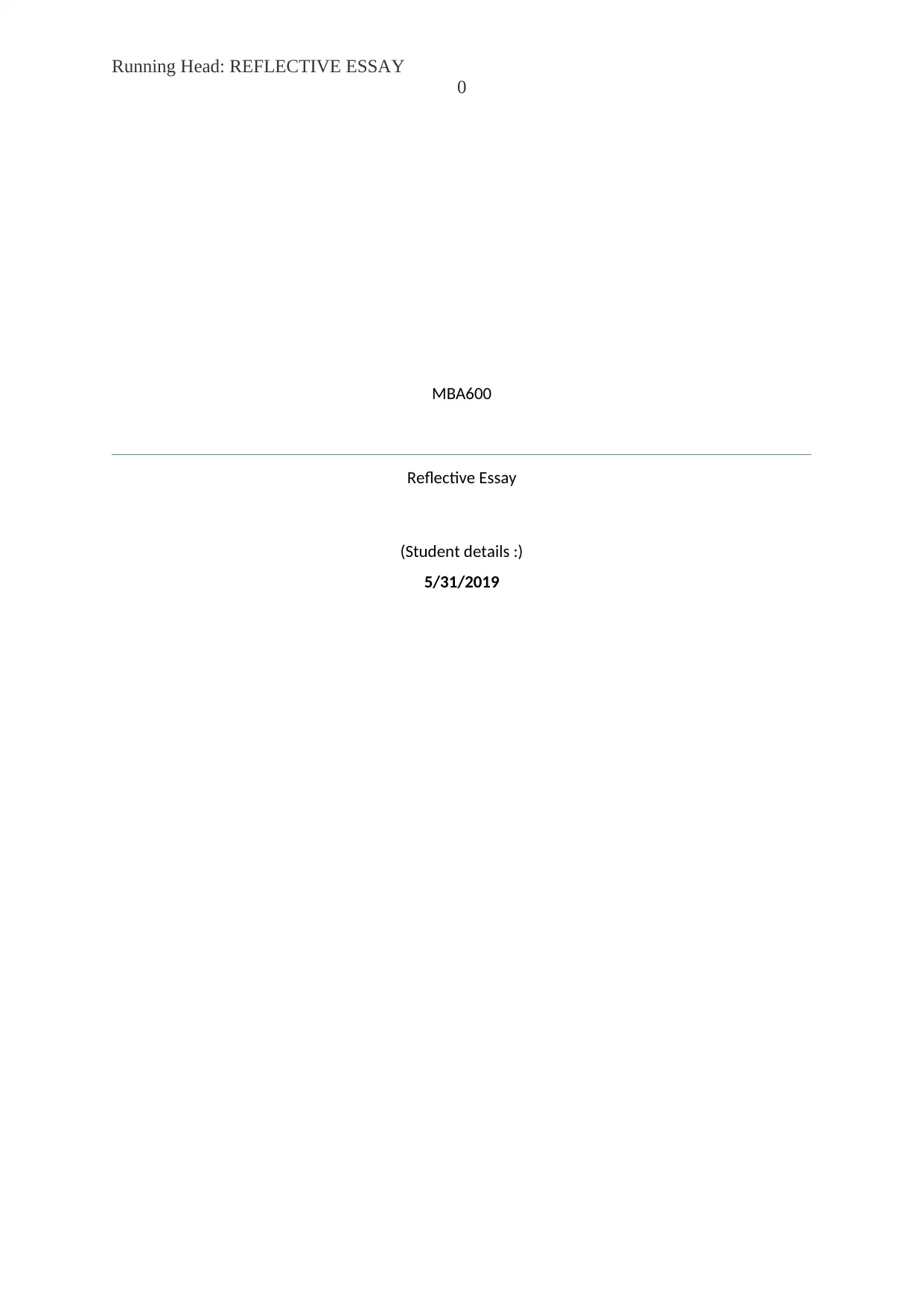
Running Head: REFLECTIVE ESSAY
0
MBA600
Reflective Essay
(Student details :)
5/31/2019
0
MBA600
Reflective Essay
(Student details :)
5/31/2019
Paraphrase This Document
Need a fresh take? Get an instant paraphrase of this document with our AI Paraphraser
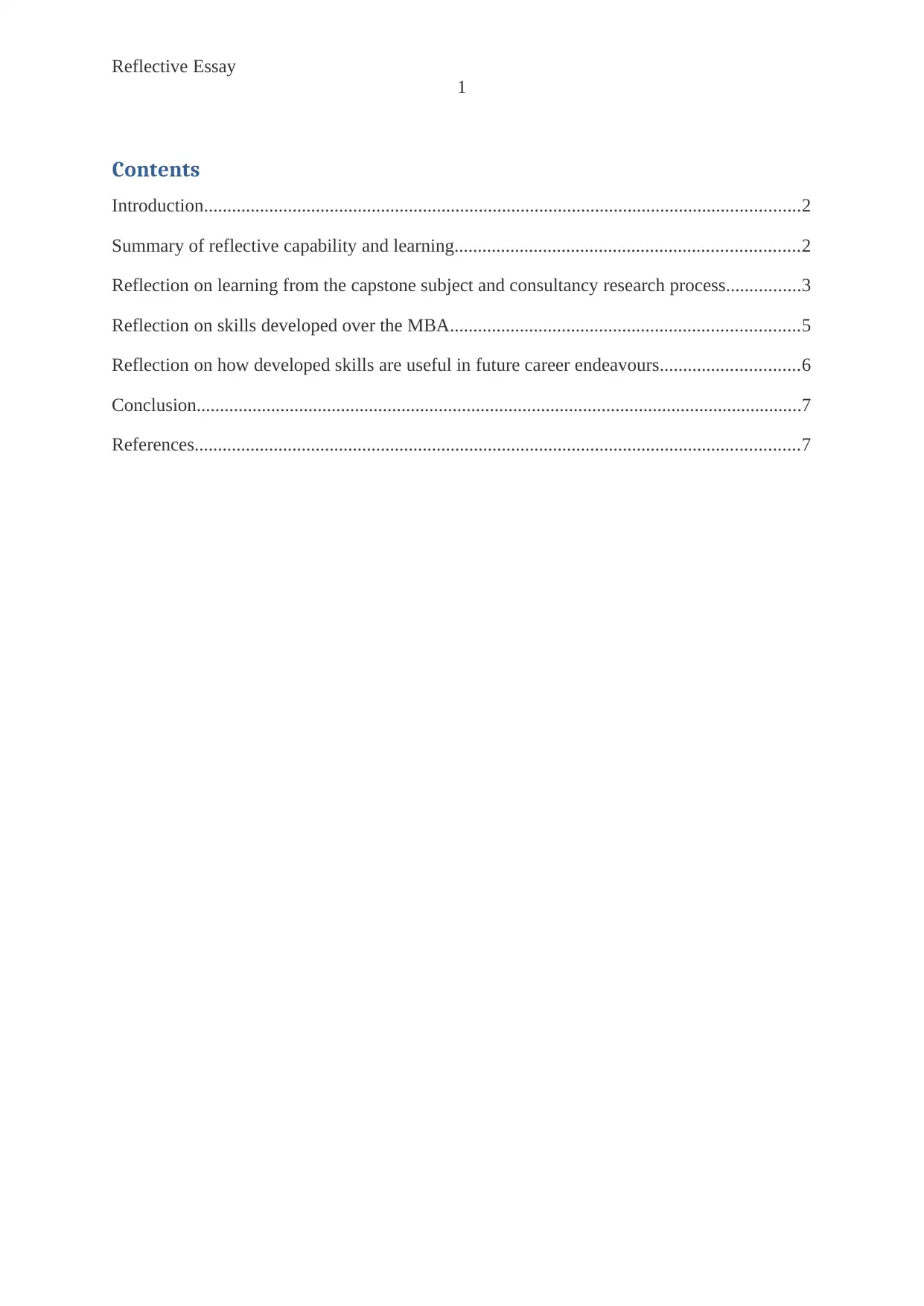
Reflective Essay
1
Contents
Introduction................................................................................................................................2
Summary of reflective capability and learning..........................................................................2
Reflection on learning from the capstone subject and consultancy research process................3
Reflection on skills developed over the MBA...........................................................................5
Reflection on how developed skills are useful in future career endeavours..............................6
Conclusion..................................................................................................................................7
References..................................................................................................................................7
1
Contents
Introduction................................................................................................................................2
Summary of reflective capability and learning..........................................................................2
Reflection on learning from the capstone subject and consultancy research process................3
Reflection on skills developed over the MBA...........................................................................5
Reflection on how developed skills are useful in future career endeavours..............................6
Conclusion..................................................................................................................................7
References..................................................................................................................................7
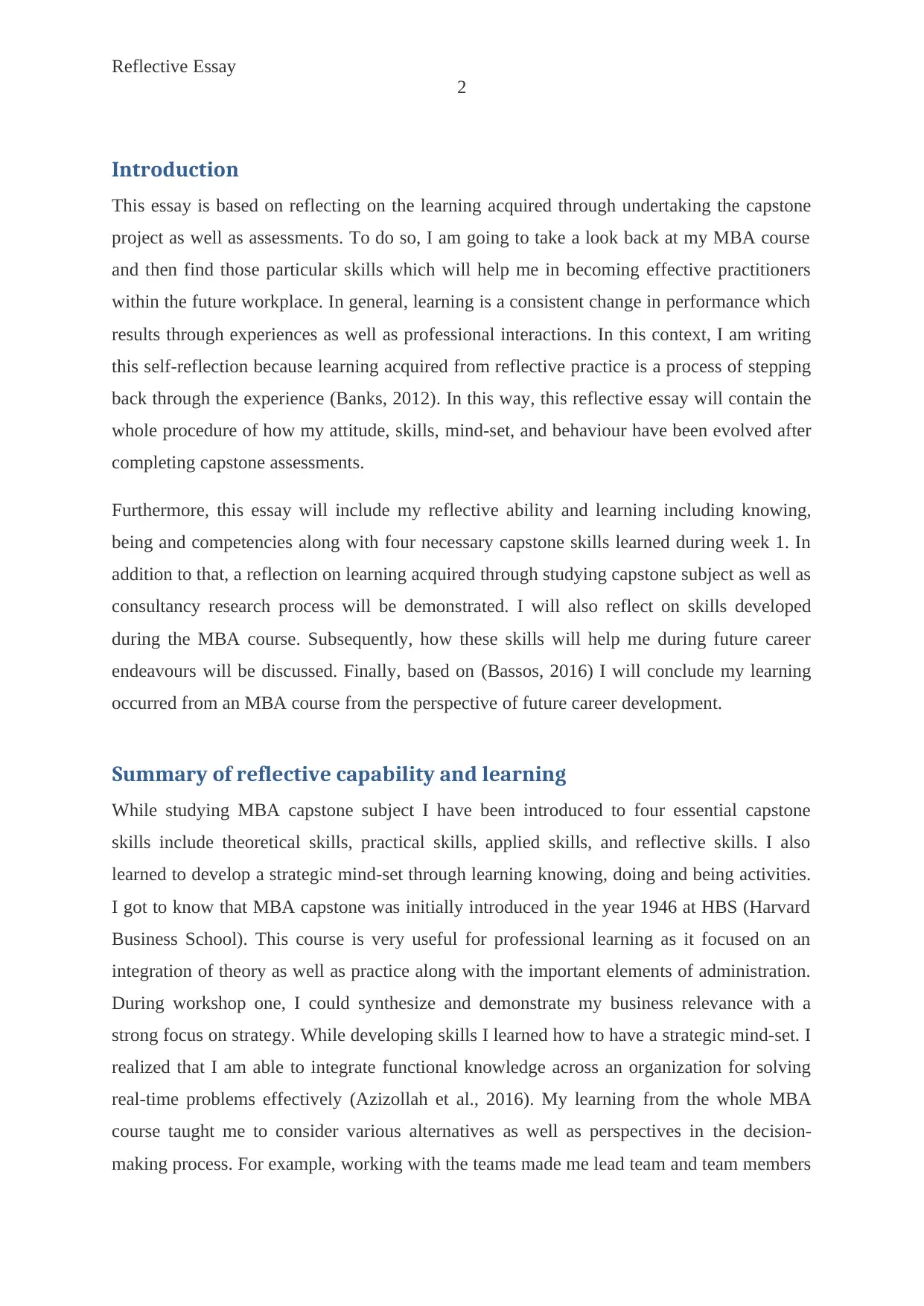
Reflective Essay
2
Introduction
This essay is based on reflecting on the learning acquired through undertaking the capstone
project as well as assessments. To do so, I am going to take a look back at my MBA course
and then find those particular skills which will help me in becoming effective practitioners
within the future workplace. In general, learning is a consistent change in performance which
results through experiences as well as professional interactions. In this context, I am writing
this self-reflection because learning acquired from reflective practice is a process of stepping
back through the experience (Banks, 2012). In this way, this reflective essay will contain the
whole procedure of how my attitude, skills, mind-set, and behaviour have been evolved after
completing capstone assessments.
Furthermore, this essay will include my reflective ability and learning including knowing,
being and competencies along with four necessary capstone skills learned during week 1. In
addition to that, a reflection on learning acquired through studying capstone subject as well as
consultancy research process will be demonstrated. I will also reflect on skills developed
during the MBA course. Subsequently, how these skills will help me during future career
endeavours will be discussed. Finally, based on (Bassos, 2016) I will conclude my learning
occurred from an MBA course from the perspective of future career development.
Summary of reflective capability and learning
While studying MBA capstone subject I have been introduced to four essential capstone
skills include theoretical skills, practical skills, applied skills, and reflective skills. I also
learned to develop a strategic mind-set through learning knowing, doing and being activities.
I got to know that MBA capstone was initially introduced in the year 1946 at HBS (Harvard
Business School). This course is very useful for professional learning as it focused on an
integration of theory as well as practice along with the important elements of administration.
During workshop one, I could synthesize and demonstrate my business relevance with a
strong focus on strategy. While developing skills I learned how to have a strategic mind-set. I
realized that I am able to integrate functional knowledge across an organization for solving
real-time problems effectively (Azizollah et al., 2016). My learning from the whole MBA
course taught me to consider various alternatives as well as perspectives in the decision-
making process. For example, working with the teams made me lead team and team members
2
Introduction
This essay is based on reflecting on the learning acquired through undertaking the capstone
project as well as assessments. To do so, I am going to take a look back at my MBA course
and then find those particular skills which will help me in becoming effective practitioners
within the future workplace. In general, learning is a consistent change in performance which
results through experiences as well as professional interactions. In this context, I am writing
this self-reflection because learning acquired from reflective practice is a process of stepping
back through the experience (Banks, 2012). In this way, this reflective essay will contain the
whole procedure of how my attitude, skills, mind-set, and behaviour have been evolved after
completing capstone assessments.
Furthermore, this essay will include my reflective ability and learning including knowing,
being and competencies along with four necessary capstone skills learned during week 1. In
addition to that, a reflection on learning acquired through studying capstone subject as well as
consultancy research process will be demonstrated. I will also reflect on skills developed
during the MBA course. Subsequently, how these skills will help me during future career
endeavours will be discussed. Finally, based on (Bassos, 2016) I will conclude my learning
occurred from an MBA course from the perspective of future career development.
Summary of reflective capability and learning
While studying MBA capstone subject I have been introduced to four essential capstone
skills include theoretical skills, practical skills, applied skills, and reflective skills. I also
learned to develop a strategic mind-set through learning knowing, doing and being activities.
I got to know that MBA capstone was initially introduced in the year 1946 at HBS (Harvard
Business School). This course is very useful for professional learning as it focused on an
integration of theory as well as practice along with the important elements of administration.
During workshop one, I could synthesize and demonstrate my business relevance with a
strong focus on strategy. While developing skills I learned how to have a strategic mind-set. I
realized that I am able to integrate functional knowledge across an organization for solving
real-time problems effectively (Azizollah et al., 2016). My learning from the whole MBA
course taught me to consider various alternatives as well as perspectives in the decision-
making process. For example, working with the teams made me lead team and team members
⊘ This is a preview!⊘
Do you want full access?
Subscribe today to unlock all pages.

Trusted by 1+ million students worldwide
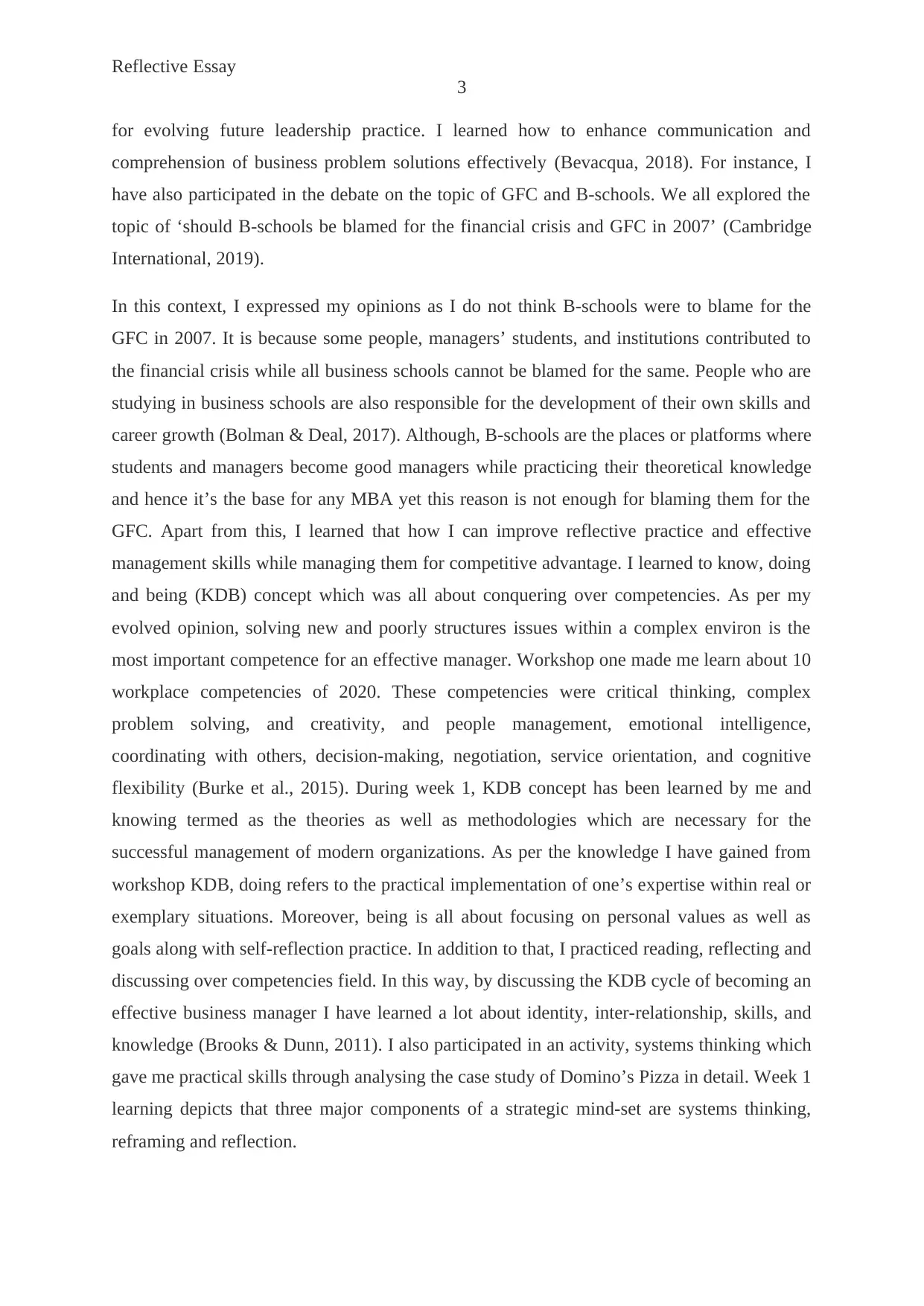
Reflective Essay
3
for evolving future leadership practice. I learned how to enhance communication and
comprehension of business problem solutions effectively (Bevacqua, 2018). For instance, I
have also participated in the debate on the topic of GFC and B-schools. We all explored the
topic of ‘should B-schools be blamed for the financial crisis and GFC in 2007’ (Cambridge
International, 2019).
In this context, I expressed my opinions as I do not think B-schools were to blame for the
GFC in 2007. It is because some people, managers’ students, and institutions contributed to
the financial crisis while all business schools cannot be blamed for the same. People who are
studying in business schools are also responsible for the development of their own skills and
career growth (Bolman & Deal, 2017). Although, B-schools are the places or platforms where
students and managers become good managers while practicing their theoretical knowledge
and hence it’s the base for any MBA yet this reason is not enough for blaming them for the
GFC. Apart from this, I learned that how I can improve reflective practice and effective
management skills while managing them for competitive advantage. I learned to know, doing
and being (KDB) concept which was all about conquering over competencies. As per my
evolved opinion, solving new and poorly structures issues within a complex environ is the
most important competence for an effective manager. Workshop one made me learn about 10
workplace competencies of 2020. These competencies were critical thinking, complex
problem solving, and creativity, and people management, emotional intelligence,
coordinating with others, decision-making, negotiation, service orientation, and cognitive
flexibility (Burke et al., 2015). During week 1, KDB concept has been learned by me and
knowing termed as the theories as well as methodologies which are necessary for the
successful management of modern organizations. As per the knowledge I have gained from
workshop KDB, doing refers to the practical implementation of one’s expertise within real or
exemplary situations. Moreover, being is all about focusing on personal values as well as
goals along with self-reflection practice. In addition to that, I practiced reading, reflecting and
discussing over competencies field. In this way, by discussing the KDB cycle of becoming an
effective business manager I have learned a lot about identity, inter-relationship, skills, and
knowledge (Brooks & Dunn, 2011). I also participated in an activity, systems thinking which
gave me practical skills through analysing the case study of Domino’s Pizza in detail. Week 1
learning depicts that three major components of a strategic mind-set are systems thinking,
reframing and reflection.
3
for evolving future leadership practice. I learned how to enhance communication and
comprehension of business problem solutions effectively (Bevacqua, 2018). For instance, I
have also participated in the debate on the topic of GFC and B-schools. We all explored the
topic of ‘should B-schools be blamed for the financial crisis and GFC in 2007’ (Cambridge
International, 2019).
In this context, I expressed my opinions as I do not think B-schools were to blame for the
GFC in 2007. It is because some people, managers’ students, and institutions contributed to
the financial crisis while all business schools cannot be blamed for the same. People who are
studying in business schools are also responsible for the development of their own skills and
career growth (Bolman & Deal, 2017). Although, B-schools are the places or platforms where
students and managers become good managers while practicing their theoretical knowledge
and hence it’s the base for any MBA yet this reason is not enough for blaming them for the
GFC. Apart from this, I learned that how I can improve reflective practice and effective
management skills while managing them for competitive advantage. I learned to know, doing
and being (KDB) concept which was all about conquering over competencies. As per my
evolved opinion, solving new and poorly structures issues within a complex environ is the
most important competence for an effective manager. Workshop one made me learn about 10
workplace competencies of 2020. These competencies were critical thinking, complex
problem solving, and creativity, and people management, emotional intelligence,
coordinating with others, decision-making, negotiation, service orientation, and cognitive
flexibility (Burke et al., 2015). During week 1, KDB concept has been learned by me and
knowing termed as the theories as well as methodologies which are necessary for the
successful management of modern organizations. As per the knowledge I have gained from
workshop KDB, doing refers to the practical implementation of one’s expertise within real or
exemplary situations. Moreover, being is all about focusing on personal values as well as
goals along with self-reflection practice. In addition to that, I practiced reading, reflecting and
discussing over competencies field. In this way, by discussing the KDB cycle of becoming an
effective business manager I have learned a lot about identity, inter-relationship, skills, and
knowledge (Brooks & Dunn, 2011). I also participated in an activity, systems thinking which
gave me practical skills through analysing the case study of Domino’s Pizza in detail. Week 1
learning depicts that three major components of a strategic mind-set are systems thinking,
reframing and reflection.
Paraphrase This Document
Need a fresh take? Get an instant paraphrase of this document with our AI Paraphraser
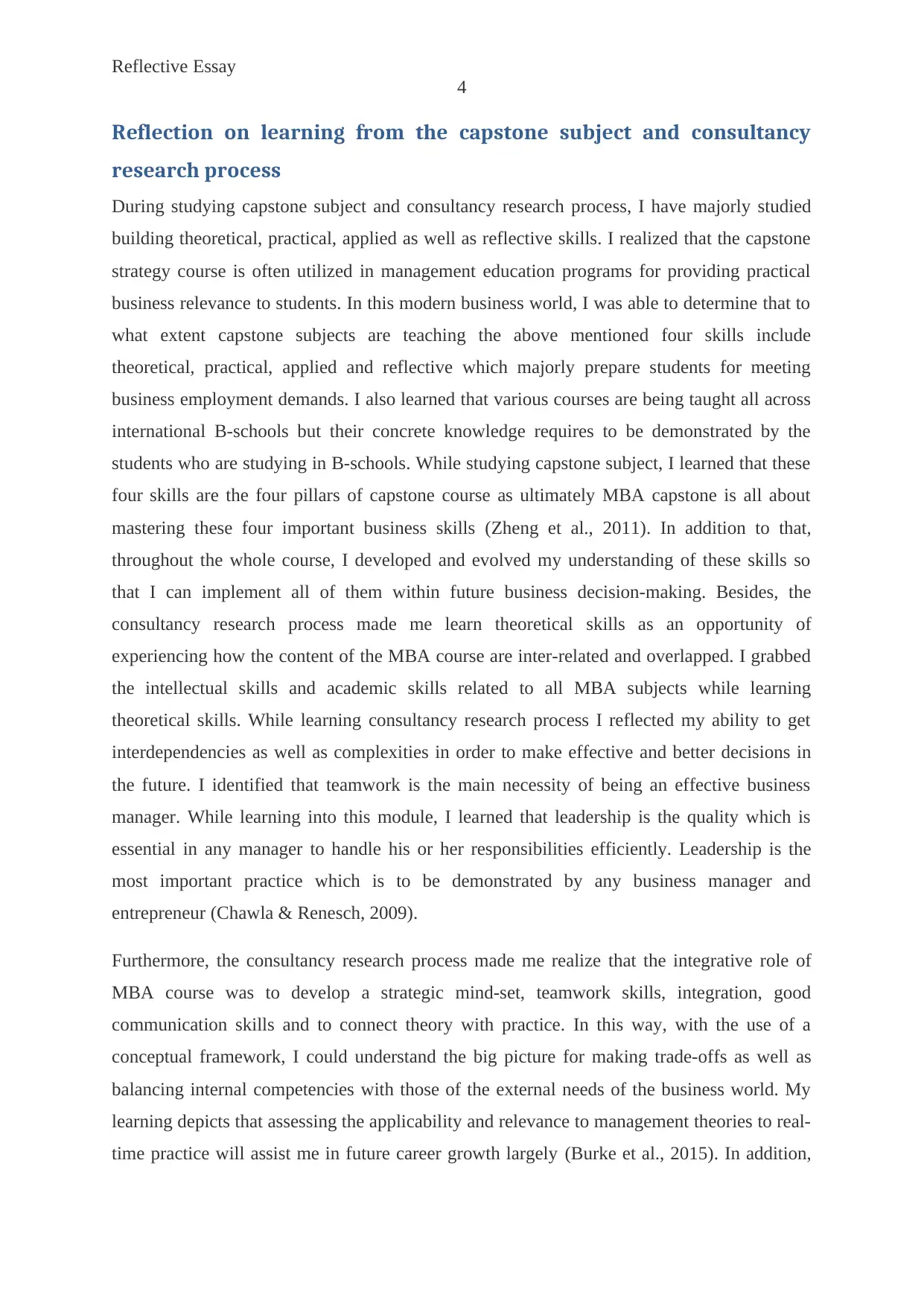
Reflective Essay
4
Reflection on learning from the capstone subject and consultancy
research process
During studying capstone subject and consultancy research process, I have majorly studied
building theoretical, practical, applied as well as reflective skills. I realized that the capstone
strategy course is often utilized in management education programs for providing practical
business relevance to students. In this modern business world, I was able to determine that to
what extent capstone subjects are teaching the above mentioned four skills include
theoretical, practical, applied and reflective which majorly prepare students for meeting
business employment demands. I also learned that various courses are being taught all across
international B-schools but their concrete knowledge requires to be demonstrated by the
students who are studying in B-schools. While studying capstone subject, I learned that these
four skills are the four pillars of capstone course as ultimately MBA capstone is all about
mastering these four important business skills (Zheng et al., 2011). In addition to that,
throughout the whole course, I developed and evolved my understanding of these skills so
that I can implement all of them within future business decision-making. Besides, the
consultancy research process made me learn theoretical skills as an opportunity of
experiencing how the content of the MBA course are inter-related and overlapped. I grabbed
the intellectual skills and academic skills related to all MBA subjects while learning
theoretical skills. While learning consultancy research process I reflected my ability to get
interdependencies as well as complexities in order to make effective and better decisions in
the future. I identified that teamwork is the main necessity of being an effective business
manager. While learning into this module, I learned that leadership is the quality which is
essential in any manager to handle his or her responsibilities efficiently. Leadership is the
most important practice which is to be demonstrated by any business manager and
entrepreneur (Chawla & Renesch, 2009).
Furthermore, the consultancy research process made me realize that the integrative role of
MBA course was to develop a strategic mind-set, teamwork skills, integration, good
communication skills and to connect theory with practice. In this way, with the use of a
conceptual framework, I could understand the big picture for making trade-offs as well as
balancing internal competencies with those of the external needs of the business world. My
learning depicts that assessing the applicability and relevance to management theories to real-
time practice will assist me in future career growth largely (Burke et al., 2015). In addition,
4
Reflection on learning from the capstone subject and consultancy
research process
During studying capstone subject and consultancy research process, I have majorly studied
building theoretical, practical, applied as well as reflective skills. I realized that the capstone
strategy course is often utilized in management education programs for providing practical
business relevance to students. In this modern business world, I was able to determine that to
what extent capstone subjects are teaching the above mentioned four skills include
theoretical, practical, applied and reflective which majorly prepare students for meeting
business employment demands. I also learned that various courses are being taught all across
international B-schools but their concrete knowledge requires to be demonstrated by the
students who are studying in B-schools. While studying capstone subject, I learned that these
four skills are the four pillars of capstone course as ultimately MBA capstone is all about
mastering these four important business skills (Zheng et al., 2011). In addition to that,
throughout the whole course, I developed and evolved my understanding of these skills so
that I can implement all of them within future business decision-making. Besides, the
consultancy research process made me learn theoretical skills as an opportunity of
experiencing how the content of the MBA course are inter-related and overlapped. I grabbed
the intellectual skills and academic skills related to all MBA subjects while learning
theoretical skills. While learning consultancy research process I reflected my ability to get
interdependencies as well as complexities in order to make effective and better decisions in
the future. I identified that teamwork is the main necessity of being an effective business
manager. While learning into this module, I learned that leadership is the quality which is
essential in any manager to handle his or her responsibilities efficiently. Leadership is the
most important practice which is to be demonstrated by any business manager and
entrepreneur (Chawla & Renesch, 2009).
Furthermore, the consultancy research process made me realize that the integrative role of
MBA course was to develop a strategic mind-set, teamwork skills, integration, good
communication skills and to connect theory with practice. In this way, with the use of a
conceptual framework, I could understand the big picture for making trade-offs as well as
balancing internal competencies with those of the external needs of the business world. My
learning depicts that assessing the applicability and relevance to management theories to real-
time practice will assist me in future career growth largely (Burke et al., 2015). In addition,
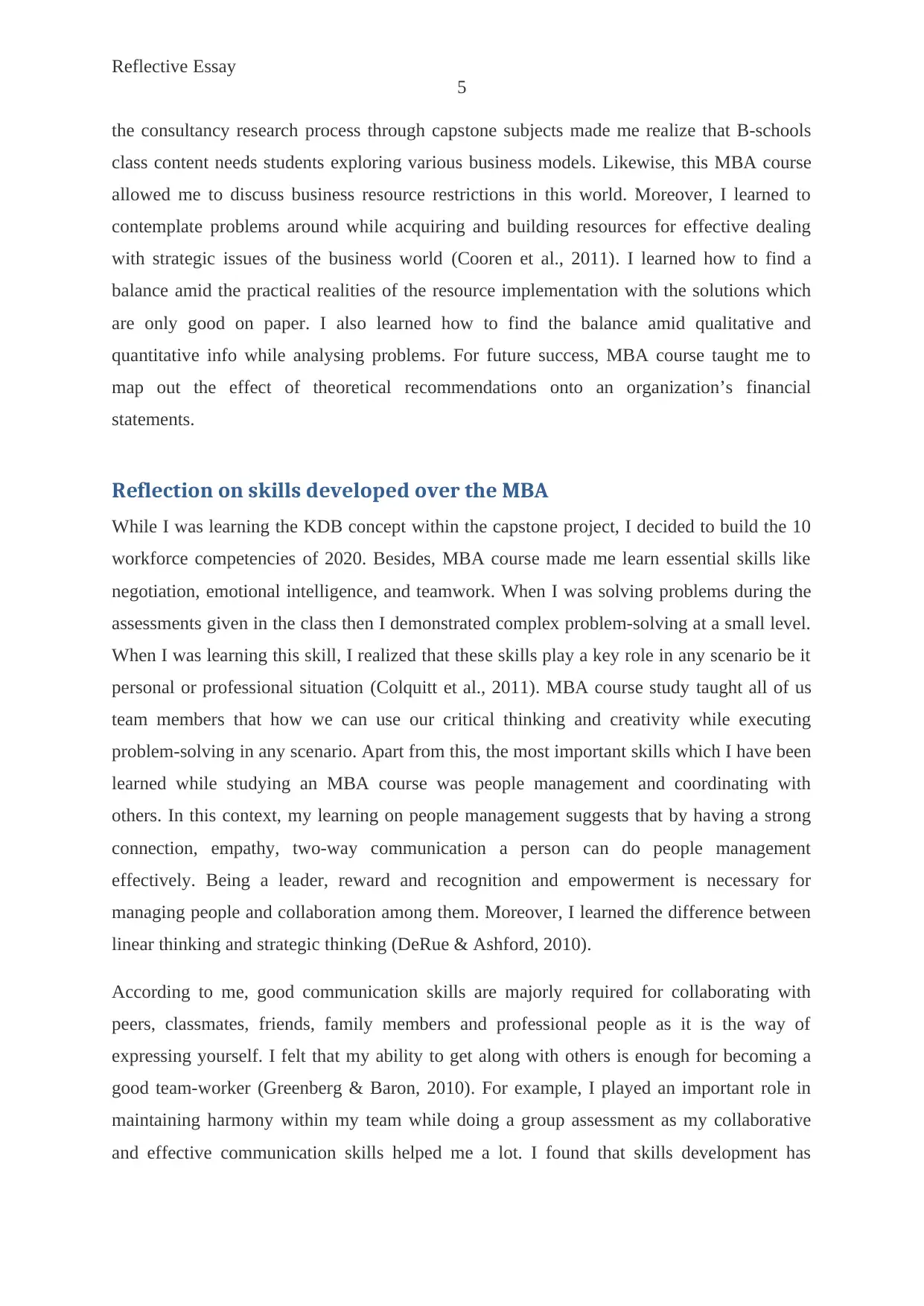
Reflective Essay
5
the consultancy research process through capstone subjects made me realize that B-schools
class content needs students exploring various business models. Likewise, this MBA course
allowed me to discuss business resource restrictions in this world. Moreover, I learned to
contemplate problems around while acquiring and building resources for effective dealing
with strategic issues of the business world (Cooren et al., 2011). I learned how to find a
balance amid the practical realities of the resource implementation with the solutions which
are only good on paper. I also learned how to find the balance amid qualitative and
quantitative info while analysing problems. For future success, MBA course taught me to
map out the effect of theoretical recommendations onto an organization’s financial
statements.
Reflection on skills developed over the MBA
While I was learning the KDB concept within the capstone project, I decided to build the 10
workforce competencies of 2020. Besides, MBA course made me learn essential skills like
negotiation, emotional intelligence, and teamwork. When I was solving problems during the
assessments given in the class then I demonstrated complex problem-solving at a small level.
When I was learning this skill, I realized that these skills play a key role in any scenario be it
personal or professional situation (Colquitt et al., 2011). MBA course study taught all of us
team members that how we can use our critical thinking and creativity while executing
problem-solving in any scenario. Apart from this, the most important skills which I have been
learned while studying an MBA course was people management and coordinating with
others. In this context, my learning on people management suggests that by having a strong
connection, empathy, two-way communication a person can do people management
effectively. Being a leader, reward and recognition and empowerment is necessary for
managing people and collaboration among them. Moreover, I learned the difference between
linear thinking and strategic thinking (DeRue & Ashford, 2010).
According to me, good communication skills are majorly required for collaborating with
peers, classmates, friends, family members and professional people as it is the way of
expressing yourself. I felt that my ability to get along with others is enough for becoming a
good team-worker (Greenberg & Baron, 2010). For example, I played an important role in
maintaining harmony within my team while doing a group assessment as my collaborative
and effective communication skills helped me a lot. I found that skills development has
5
the consultancy research process through capstone subjects made me realize that B-schools
class content needs students exploring various business models. Likewise, this MBA course
allowed me to discuss business resource restrictions in this world. Moreover, I learned to
contemplate problems around while acquiring and building resources for effective dealing
with strategic issues of the business world (Cooren et al., 2011). I learned how to find a
balance amid the practical realities of the resource implementation with the solutions which
are only good on paper. I also learned how to find the balance amid qualitative and
quantitative info while analysing problems. For future success, MBA course taught me to
map out the effect of theoretical recommendations onto an organization’s financial
statements.
Reflection on skills developed over the MBA
While I was learning the KDB concept within the capstone project, I decided to build the 10
workforce competencies of 2020. Besides, MBA course made me learn essential skills like
negotiation, emotional intelligence, and teamwork. When I was solving problems during the
assessments given in the class then I demonstrated complex problem-solving at a small level.
When I was learning this skill, I realized that these skills play a key role in any scenario be it
personal or professional situation (Colquitt et al., 2011). MBA course study taught all of us
team members that how we can use our critical thinking and creativity while executing
problem-solving in any scenario. Apart from this, the most important skills which I have been
learned while studying an MBA course was people management and coordinating with
others. In this context, my learning on people management suggests that by having a strong
connection, empathy, two-way communication a person can do people management
effectively. Being a leader, reward and recognition and empowerment is necessary for
managing people and collaboration among them. Moreover, I learned the difference between
linear thinking and strategic thinking (DeRue & Ashford, 2010).
According to me, good communication skills are majorly required for collaborating with
peers, classmates, friends, family members and professional people as it is the way of
expressing yourself. I felt that my ability to get along with others is enough for becoming a
good team-worker (Greenberg & Baron, 2010). For example, I played an important role in
maintaining harmony within my team while doing a group assessment as my collaborative
and effective communication skills helped me a lot. I found that skills development has
⊘ This is a preview!⊘
Do you want full access?
Subscribe today to unlock all pages.

Trusted by 1+ million students worldwide
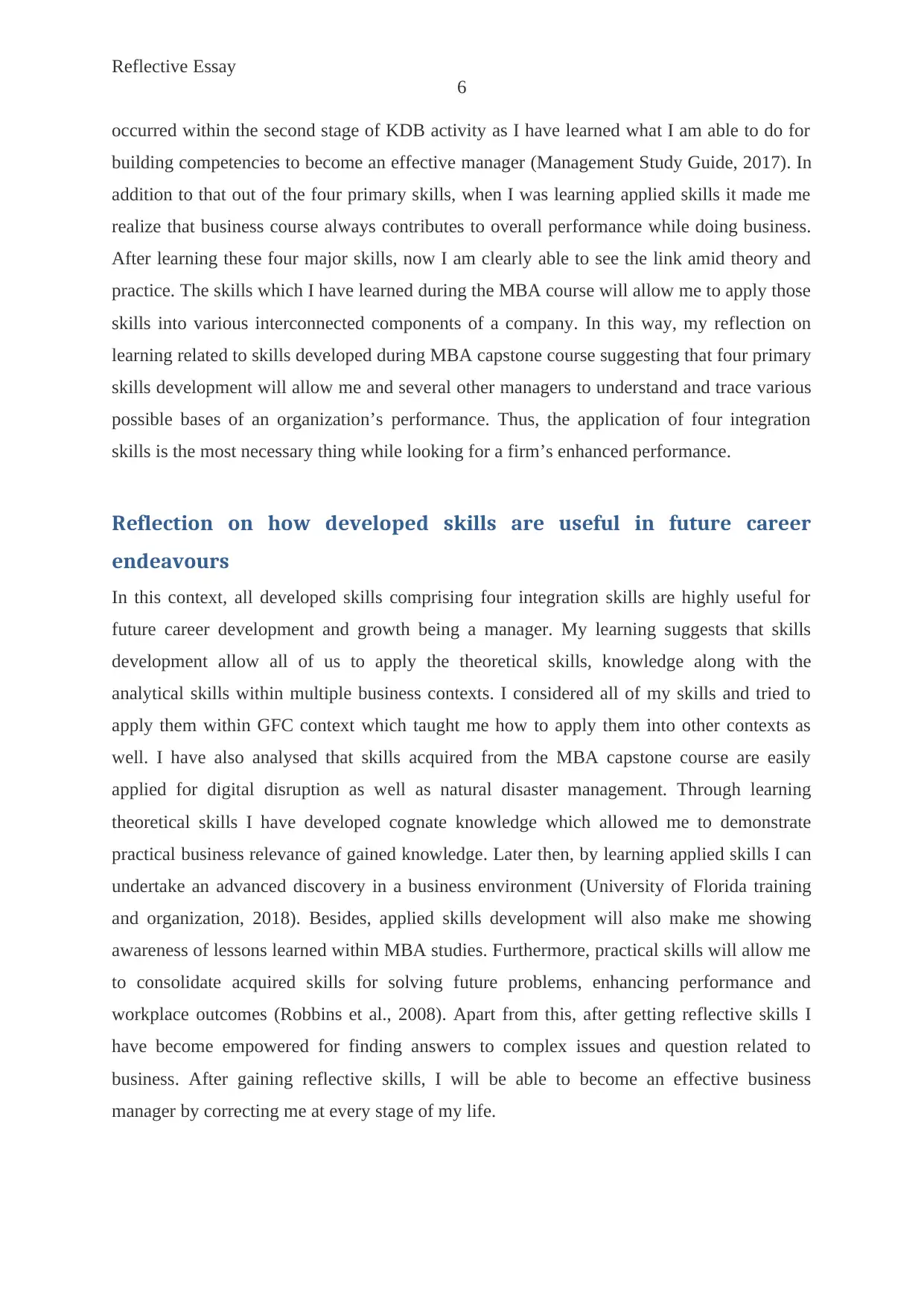
Reflective Essay
6
occurred within the second stage of KDB activity as I have learned what I am able to do for
building competencies to become an effective manager (Management Study Guide, 2017). In
addition to that out of the four primary skills, when I was learning applied skills it made me
realize that business course always contributes to overall performance while doing business.
After learning these four major skills, now I am clearly able to see the link amid theory and
practice. The skills which I have learned during the MBA course will allow me to apply those
skills into various interconnected components of a company. In this way, my reflection on
learning related to skills developed during MBA capstone course suggesting that four primary
skills development will allow me and several other managers to understand and trace various
possible bases of an organization’s performance. Thus, the application of four integration
skills is the most necessary thing while looking for a firm’s enhanced performance.
Reflection on how developed skills are useful in future career
endeavours
In this context, all developed skills comprising four integration skills are highly useful for
future career development and growth being a manager. My learning suggests that skills
development allow all of us to apply the theoretical skills, knowledge along with the
analytical skills within multiple business contexts. I considered all of my skills and tried to
apply them within GFC context which taught me how to apply them into other contexts as
well. I have also analysed that skills acquired from the MBA capstone course are easily
applied for digital disruption as well as natural disaster management. Through learning
theoretical skills I have developed cognate knowledge which allowed me to demonstrate
practical business relevance of gained knowledge. Later then, by learning applied skills I can
undertake an advanced discovery in a business environment (University of Florida training
and organization, 2018). Besides, applied skills development will also make me showing
awareness of lessons learned within MBA studies. Furthermore, practical skills will allow me
to consolidate acquired skills for solving future problems, enhancing performance and
workplace outcomes (Robbins et al., 2008). Apart from this, after getting reflective skills I
have become empowered for finding answers to complex issues and question related to
business. After gaining reflective skills, I will be able to become an effective business
manager by correcting me at every stage of my life.
6
occurred within the second stage of KDB activity as I have learned what I am able to do for
building competencies to become an effective manager (Management Study Guide, 2017). In
addition to that out of the four primary skills, when I was learning applied skills it made me
realize that business course always contributes to overall performance while doing business.
After learning these four major skills, now I am clearly able to see the link amid theory and
practice. The skills which I have learned during the MBA course will allow me to apply those
skills into various interconnected components of a company. In this way, my reflection on
learning related to skills developed during MBA capstone course suggesting that four primary
skills development will allow me and several other managers to understand and trace various
possible bases of an organization’s performance. Thus, the application of four integration
skills is the most necessary thing while looking for a firm’s enhanced performance.
Reflection on how developed skills are useful in future career
endeavours
In this context, all developed skills comprising four integration skills are highly useful for
future career development and growth being a manager. My learning suggests that skills
development allow all of us to apply the theoretical skills, knowledge along with the
analytical skills within multiple business contexts. I considered all of my skills and tried to
apply them within GFC context which taught me how to apply them into other contexts as
well. I have also analysed that skills acquired from the MBA capstone course are easily
applied for digital disruption as well as natural disaster management. Through learning
theoretical skills I have developed cognate knowledge which allowed me to demonstrate
practical business relevance of gained knowledge. Later then, by learning applied skills I can
undertake an advanced discovery in a business environment (University of Florida training
and organization, 2018). Besides, applied skills development will also make me showing
awareness of lessons learned within MBA studies. Furthermore, practical skills will allow me
to consolidate acquired skills for solving future problems, enhancing performance and
workplace outcomes (Robbins et al., 2008). Apart from this, after getting reflective skills I
have become empowered for finding answers to complex issues and question related to
business. After gaining reflective skills, I will be able to become an effective business
manager by correcting me at every stage of my life.
Paraphrase This Document
Need a fresh take? Get an instant paraphrase of this document with our AI Paraphraser
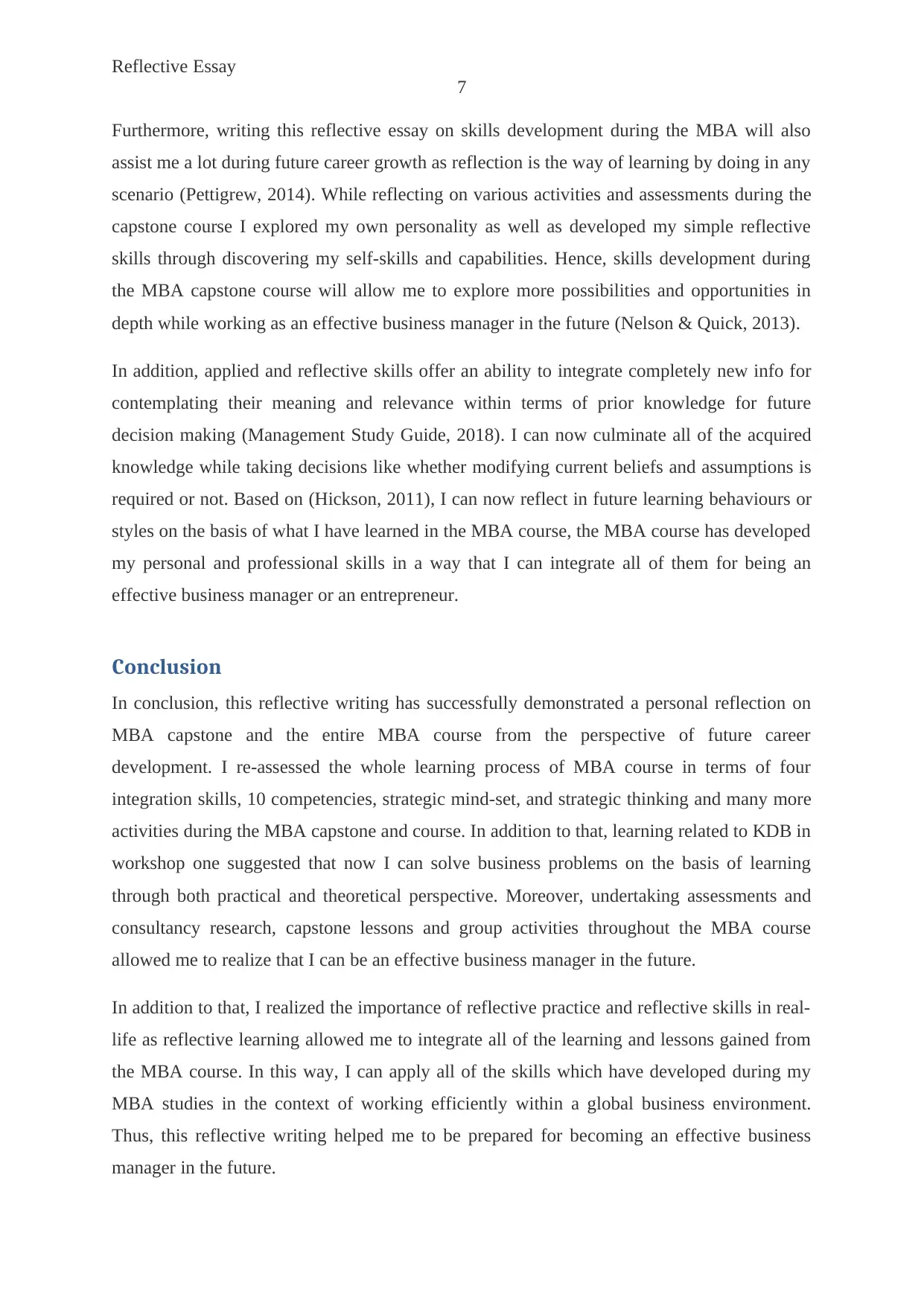
Reflective Essay
7
Furthermore, writing this reflective essay on skills development during the MBA will also
assist me a lot during future career growth as reflection is the way of learning by doing in any
scenario (Pettigrew, 2014). While reflecting on various activities and assessments during the
capstone course I explored my own personality as well as developed my simple reflective
skills through discovering my self-skills and capabilities. Hence, skills development during
the MBA capstone course will allow me to explore more possibilities and opportunities in
depth while working as an effective business manager in the future (Nelson & Quick, 2013).
In addition, applied and reflective skills offer an ability to integrate completely new info for
contemplating their meaning and relevance within terms of prior knowledge for future
decision making (Management Study Guide, 2018). I can now culminate all of the acquired
knowledge while taking decisions like whether modifying current beliefs and assumptions is
required or not. Based on (Hickson, 2011), I can now reflect in future learning behaviours or
styles on the basis of what I have learned in the MBA course, the MBA course has developed
my personal and professional skills in a way that I can integrate all of them for being an
effective business manager or an entrepreneur.
Conclusion
In conclusion, this reflective writing has successfully demonstrated a personal reflection on
MBA capstone and the entire MBA course from the perspective of future career
development. I re-assessed the whole learning process of MBA course in terms of four
integration skills, 10 competencies, strategic mind-set, and strategic thinking and many more
activities during the MBA capstone and course. In addition to that, learning related to KDB in
workshop one suggested that now I can solve business problems on the basis of learning
through both practical and theoretical perspective. Moreover, undertaking assessments and
consultancy research, capstone lessons and group activities throughout the MBA course
allowed me to realize that I can be an effective business manager in the future.
In addition to that, I realized the importance of reflective practice and reflective skills in real-
life as reflective learning allowed me to integrate all of the learning and lessons gained from
the MBA course. In this way, I can apply all of the skills which have developed during my
MBA studies in the context of working efficiently within a global business environment.
Thus, this reflective writing helped me to be prepared for becoming an effective business
manager in the future.
7
Furthermore, writing this reflective essay on skills development during the MBA will also
assist me a lot during future career growth as reflection is the way of learning by doing in any
scenario (Pettigrew, 2014). While reflecting on various activities and assessments during the
capstone course I explored my own personality as well as developed my simple reflective
skills through discovering my self-skills and capabilities. Hence, skills development during
the MBA capstone course will allow me to explore more possibilities and opportunities in
depth while working as an effective business manager in the future (Nelson & Quick, 2013).
In addition, applied and reflective skills offer an ability to integrate completely new info for
contemplating their meaning and relevance within terms of prior knowledge for future
decision making (Management Study Guide, 2018). I can now culminate all of the acquired
knowledge while taking decisions like whether modifying current beliefs and assumptions is
required or not. Based on (Hickson, 2011), I can now reflect in future learning behaviours or
styles on the basis of what I have learned in the MBA course, the MBA course has developed
my personal and professional skills in a way that I can integrate all of them for being an
effective business manager or an entrepreneur.
Conclusion
In conclusion, this reflective writing has successfully demonstrated a personal reflection on
MBA capstone and the entire MBA course from the perspective of future career
development. I re-assessed the whole learning process of MBA course in terms of four
integration skills, 10 competencies, strategic mind-set, and strategic thinking and many more
activities during the MBA capstone and course. In addition to that, learning related to KDB in
workshop one suggested that now I can solve business problems on the basis of learning
through both practical and theoretical perspective. Moreover, undertaking assessments and
consultancy research, capstone lessons and group activities throughout the MBA course
allowed me to realize that I can be an effective business manager in the future.
In addition to that, I realized the importance of reflective practice and reflective skills in real-
life as reflective learning allowed me to integrate all of the learning and lessons gained from
the MBA course. In this way, I can apply all of the skills which have developed during my
MBA studies in the context of working efficiently within a global business environment.
Thus, this reflective writing helped me to be prepared for becoming an effective business
manager in the future.
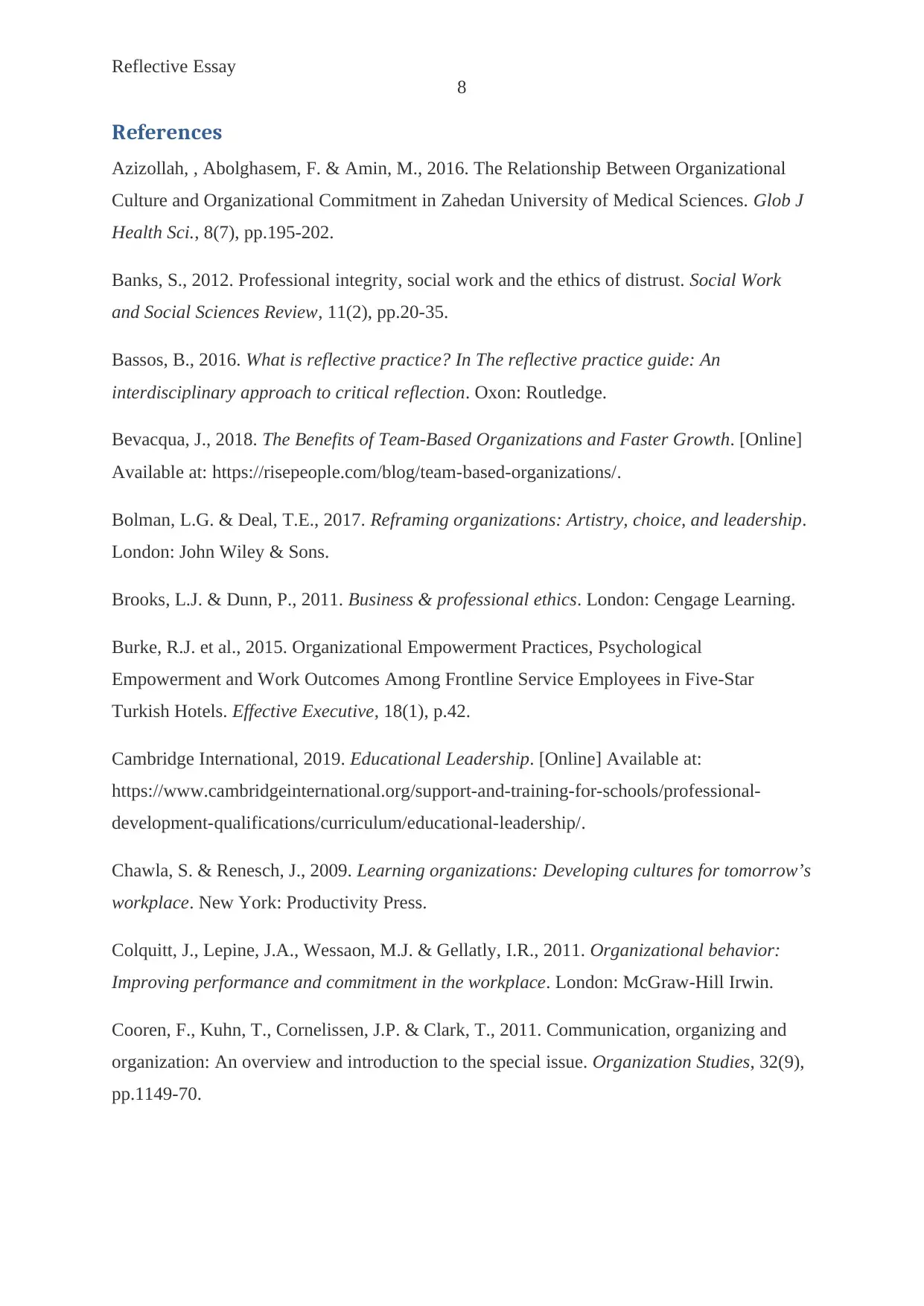
Reflective Essay
8
References
Azizollah, , Abolghasem, F. & Amin, M., 2016. The Relationship Between Organizational
Culture and Organizational Commitment in Zahedan University of Medical Sciences. Glob J
Health Sci., 8(7), pp.195-202.
Banks, S., 2012. Professional integrity, social work and the ethics of distrust. Social Work
and Social Sciences Review, 11(2), pp.20-35.
Bassos, B., 2016. What is reflective practice? In The reflective practice guide: An
interdisciplinary approach to critical reflection. Oxon: Routledge.
Bevacqua, J., 2018. The Benefits of Team-Based Organizations and Faster Growth. [Online]
Available at: https://risepeople.com/blog/team-based-organizations/.
Bolman, L.G. & Deal, T.E., 2017. Reframing organizations: Artistry, choice, and leadership.
London: John Wiley & Sons.
Brooks, L.J. & Dunn, P., 2011. Business & professional ethics. London: Cengage Learning.
Burke, R.J. et al., 2015. Organizational Empowerment Practices, Psychological
Empowerment and Work Outcomes Among Frontline Service Employees in Five-Star
Turkish Hotels. Effective Executive, 18(1), p.42.
Cambridge International, 2019. Educational Leadership. [Online] Available at:
https://www.cambridgeinternational.org/support-and-training-for-schools/professional-
development-qualifications/curriculum/educational-leadership/.
Chawla, S. & Renesch, J., 2009. Learning organizations: Developing cultures for tomorrow’s
workplace. New York: Productivity Press.
Colquitt, J., Lepine, J.A., Wessaon, M.J. & Gellatly, I.R., 2011. Organizational behavior:
Improving performance and commitment in the workplace. London: McGraw-Hill Irwin.
Cooren, F., Kuhn, T., Cornelissen, J.P. & Clark, T., 2011. Communication, organizing and
organization: An overview and introduction to the special issue. Organization Studies, 32(9),
pp.1149-70.
8
References
Azizollah, , Abolghasem, F. & Amin, M., 2016. The Relationship Between Organizational
Culture and Organizational Commitment in Zahedan University of Medical Sciences. Glob J
Health Sci., 8(7), pp.195-202.
Banks, S., 2012. Professional integrity, social work and the ethics of distrust. Social Work
and Social Sciences Review, 11(2), pp.20-35.
Bassos, B., 2016. What is reflective practice? In The reflective practice guide: An
interdisciplinary approach to critical reflection. Oxon: Routledge.
Bevacqua, J., 2018. The Benefits of Team-Based Organizations and Faster Growth. [Online]
Available at: https://risepeople.com/blog/team-based-organizations/.
Bolman, L.G. & Deal, T.E., 2017. Reframing organizations: Artistry, choice, and leadership.
London: John Wiley & Sons.
Brooks, L.J. & Dunn, P., 2011. Business & professional ethics. London: Cengage Learning.
Burke, R.J. et al., 2015. Organizational Empowerment Practices, Psychological
Empowerment and Work Outcomes Among Frontline Service Employees in Five-Star
Turkish Hotels. Effective Executive, 18(1), p.42.
Cambridge International, 2019. Educational Leadership. [Online] Available at:
https://www.cambridgeinternational.org/support-and-training-for-schools/professional-
development-qualifications/curriculum/educational-leadership/.
Chawla, S. & Renesch, J., 2009. Learning organizations: Developing cultures for tomorrow’s
workplace. New York: Productivity Press.
Colquitt, J., Lepine, J.A., Wessaon, M.J. & Gellatly, I.R., 2011. Organizational behavior:
Improving performance and commitment in the workplace. London: McGraw-Hill Irwin.
Cooren, F., Kuhn, T., Cornelissen, J.P. & Clark, T., 2011. Communication, organizing and
organization: An overview and introduction to the special issue. Organization Studies, 32(9),
pp.1149-70.
⊘ This is a preview!⊘
Do you want full access?
Subscribe today to unlock all pages.

Trusted by 1+ million students worldwide
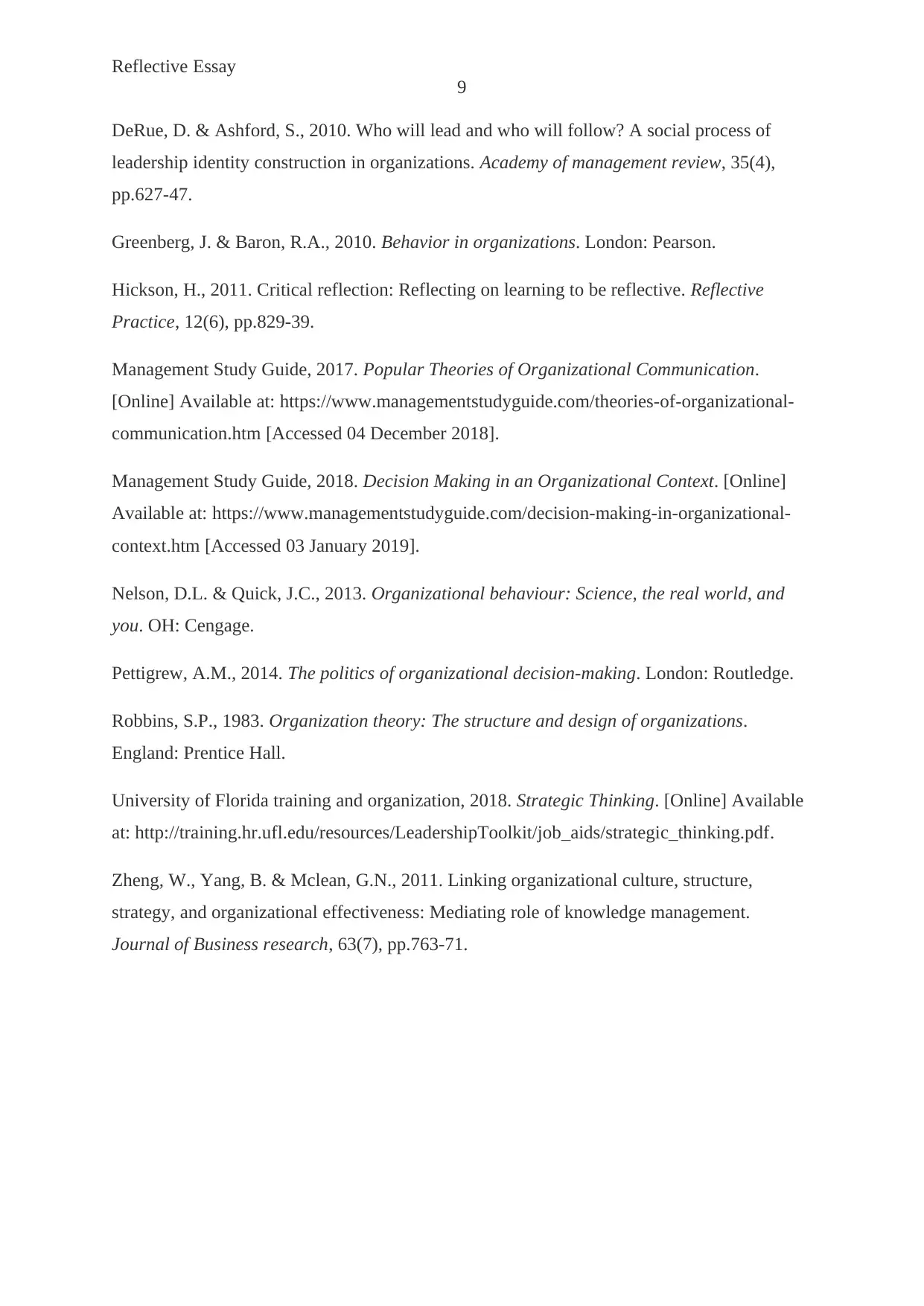
Reflective Essay
9
DeRue, D. & Ashford, S., 2010. Who will lead and who will follow? A social process of
leadership identity construction in organizations. Academy of management review, 35(4),
pp.627-47.
Greenberg, J. & Baron, R.A., 2010. Behavior in organizations. London: Pearson.
Hickson, H., 2011. Critical reflection: Reflecting on learning to be reflective. Reflective
Practice, 12(6), pp.829-39.
Management Study Guide, 2017. Popular Theories of Organizational Communication.
[Online] Available at: https://www.managementstudyguide.com/theories-of-organizational-
communication.htm [Accessed 04 December 2018].
Management Study Guide, 2018. Decision Making in an Organizational Context. [Online]
Available at: https://www.managementstudyguide.com/decision-making-in-organizational-
context.htm [Accessed 03 January 2019].
Nelson, D.L. & Quick, J.C., 2013. Organizational behaviour: Science, the real world, and
you. OH: Cengage.
Pettigrew, A.M., 2014. The politics of organizational decision-making. London: Routledge.
Robbins, S.P., 1983. Organization theory: The structure and design of organizations.
England: Prentice Hall.
University of Florida training and organization, 2018. Strategic Thinking. [Online] Available
at: http://training.hr.ufl.edu/resources/LeadershipToolkit/job_aids/strategic_thinking.pdf.
Zheng, W., Yang, B. & Mclean, G.N., 2011. Linking organizational culture, structure,
strategy, and organizational effectiveness: Mediating role of knowledge management.
Journal of Business research, 63(7), pp.763-71.
9
DeRue, D. & Ashford, S., 2010. Who will lead and who will follow? A social process of
leadership identity construction in organizations. Academy of management review, 35(4),
pp.627-47.
Greenberg, J. & Baron, R.A., 2010. Behavior in organizations. London: Pearson.
Hickson, H., 2011. Critical reflection: Reflecting on learning to be reflective. Reflective
Practice, 12(6), pp.829-39.
Management Study Guide, 2017. Popular Theories of Organizational Communication.
[Online] Available at: https://www.managementstudyguide.com/theories-of-organizational-
communication.htm [Accessed 04 December 2018].
Management Study Guide, 2018. Decision Making in an Organizational Context. [Online]
Available at: https://www.managementstudyguide.com/decision-making-in-organizational-
context.htm [Accessed 03 January 2019].
Nelson, D.L. & Quick, J.C., 2013. Organizational behaviour: Science, the real world, and
you. OH: Cengage.
Pettigrew, A.M., 2014. The politics of organizational decision-making. London: Routledge.
Robbins, S.P., 1983. Organization theory: The structure and design of organizations.
England: Prentice Hall.
University of Florida training and organization, 2018. Strategic Thinking. [Online] Available
at: http://training.hr.ufl.edu/resources/LeadershipToolkit/job_aids/strategic_thinking.pdf.
Zheng, W., Yang, B. & Mclean, G.N., 2011. Linking organizational culture, structure,
strategy, and organizational effectiveness: Mediating role of knowledge management.
Journal of Business research, 63(7), pp.763-71.
1 out of 10
Related Documents
Your All-in-One AI-Powered Toolkit for Academic Success.
+13062052269
info@desklib.com
Available 24*7 on WhatsApp / Email
![[object Object]](/_next/static/media/star-bottom.7253800d.svg)
Unlock your academic potential
Copyright © 2020–2026 A2Z Services. All Rights Reserved. Developed and managed by ZUCOL.



